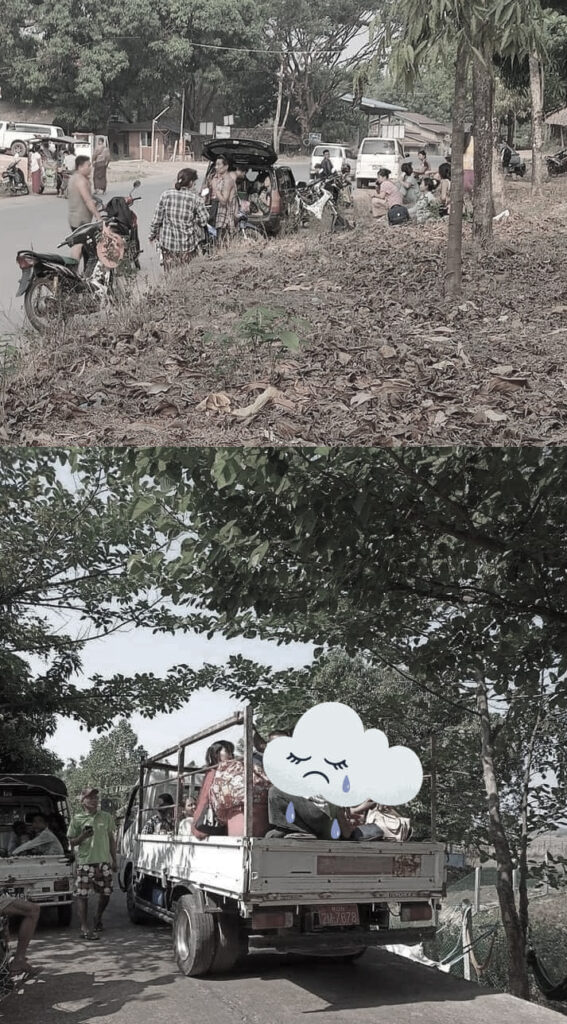Junta Troops Extort Fleeing Civilians in Kawkareik Township as Airstrikes and Shelling Intensify
April 24, 2025
As families fled deadly airstrikes and heavy shelling in Kawkareik Township, Karen State, Junta troops from Light Infantry Battalion 545 and Infantry Battalion 546 stopped them at checkpoints and demanded money and valuables. These displaced villagers, already traumatized by ongoing attacks, have faced intimidation, harassment, and demands for money along the way as they try to reach safety.
The abuses reportedly began after heavy military assaults on April 15, when junta aircraft and artillery began targeting several villages in and around Kyon Doe Town. In response, hundreds of families fled their homes in terror. At least 80 people were stopped on their way to safety and forced to give money or belongings to junta soldiers on the road.
One villager who is now staying in Mawlamyine shared what happened:
“Our family fled on the 15th after our village was hit. We hid in a bomb shelter for four days with barely any food or clothes. I have three young children—including an eight-month-old. The baby’s mother was so traumatized she stopped producing milk. Eventually, we tried to escape to Mawlamyine, but were stopped by soldiers from LIB 546. They held us for three hours. Then, they demanded 50,000 kyat per person. Some families had to pay 100,000 to 300,000 kyat. If they had no cash, they were forced to hand over watches or jewelry. It was humiliating, terrifying. Those were some of the worst days of our lives.”
Local rescue groups estimate that nearly 2,000 families from at least eight villages, including Koh Boh, Tadar Oo, Thayet Taw, Koh Khite, Koh Kyaik, and Kanni, have fled since April 15. Most have attempted to reach Mawlamyine or Hpa-an, relying on friends, relatives, and monastery shelters for refuge. Many report that junta soldiers have set up strict inspection points on key exit routes, demanding money or confiscating belongings under threat.
A humanitarian aid worker from a Mon rescue organization, speaking anonymously, confirmed the ongoing hardship.
“As of April 23, Kawkareik town remains under tight junta control. Fierce fighting continues on the outskirts, and airstrikes in surrounding villages like Kyon Doe and Kamanee are ongoing. Civilians cannot assist each other across villages because the roads are too dangerous. People mostly rely on their own communities, and they organize limited resources to help one another. There’s an urgent need for food and medicine—but the area is essentially under siege.”
From April 14 to 18, the Junta carried out a wave of bombings across Kawkareik, displacing more than 10,000 people from at least 40 villages, according to independent local sources. Most of these civilians—primarily women, children, and the elderly—are now scattered across temporary shelters in Mawlamyine and Hpa-an Townships. Monasteries, civic networks, and volunteer groups are coordinating to provide food, clothing, and basic health support, but the situation remains critical.
The extortion of civilians during armed conflict is a clear breach of international law. Under the Geneva Conventions, civilians must be protected from violence, threats, and coercion. The forced extraction of money and valuables from those fleeing conflict—especially when conducted at gunpoint—constitutes a form of pillaging, which is explicitly prohibited under international humanitarian law.
Fighting continues to rage in and around Kawkareik. As of this week, airstrikes have targeted not only homes but also schools and monasteries. Local reports confirm that on April 15, junta airstrikes killed at least 15 civilians, including monks, and injured over 30 more in Kawkareik Township alone. The attacks have paralyzed humanitarian rescue efforts. Even aid organizations operating from Mawlamyine and Hpa-an have been unable to safely access rural areas due to the risk of renewed air attacks and ambushes.
“Every day, more people are trying to escape,” one health volunteer said. “But there are no safe vehicles to pick them up. Those who can afford it pay for their own transport. Others try to slip through the forest when the shelling stops. It’s heartbreaking. They’re not just fleeing war—they’re running from extortion and fear.”
Currently, monasteries in Mawlamyine are hosting hundreds of new arrivals. Volunteers report that many of them are elderly people, mothers with small children, and students who left with nothing. Civil society organizations, religious leaders, and the Mon political parties have stepped in to provide whatever assistance they can, but without external support, the relief effort may not be sustainable.




















































